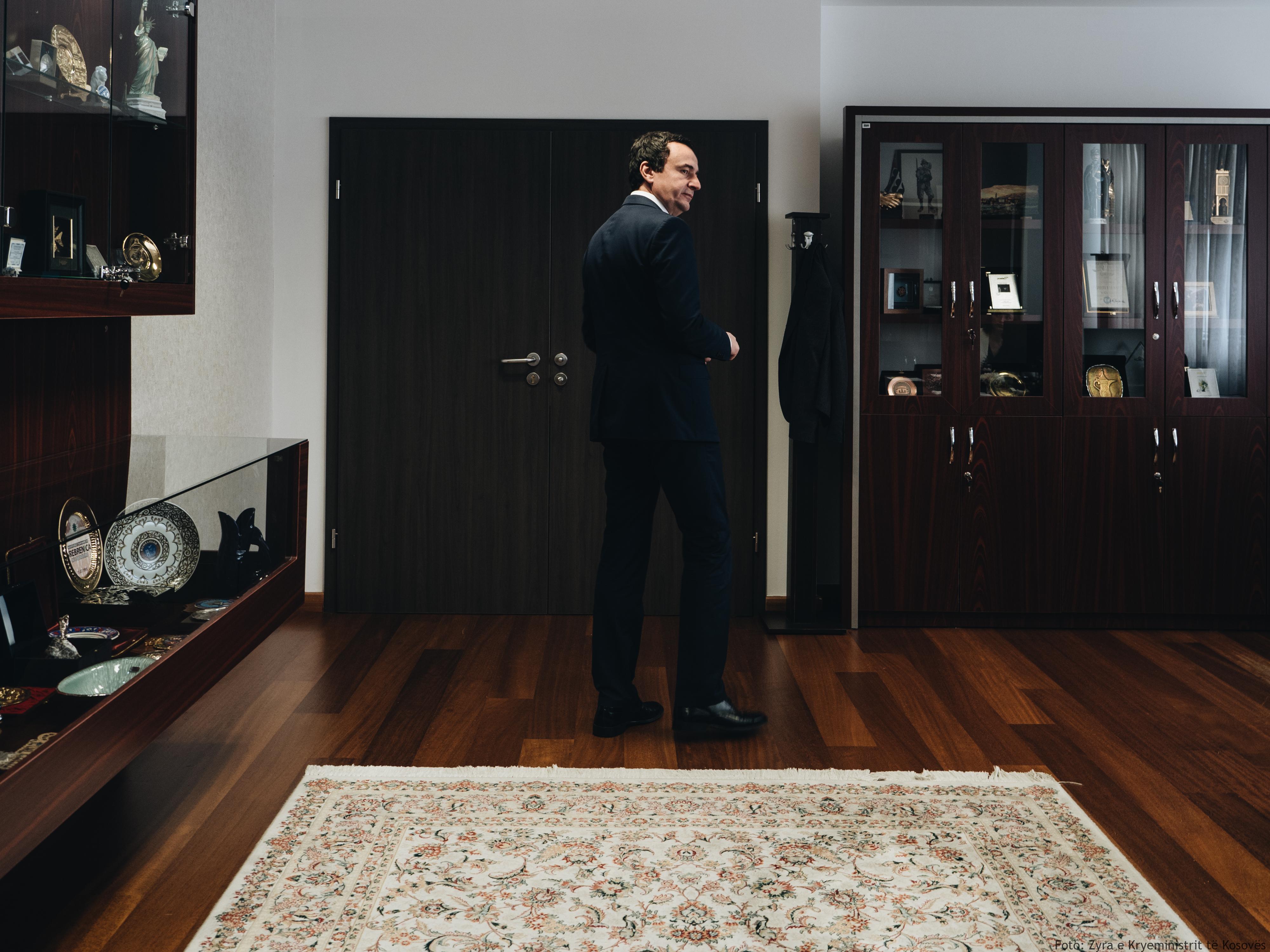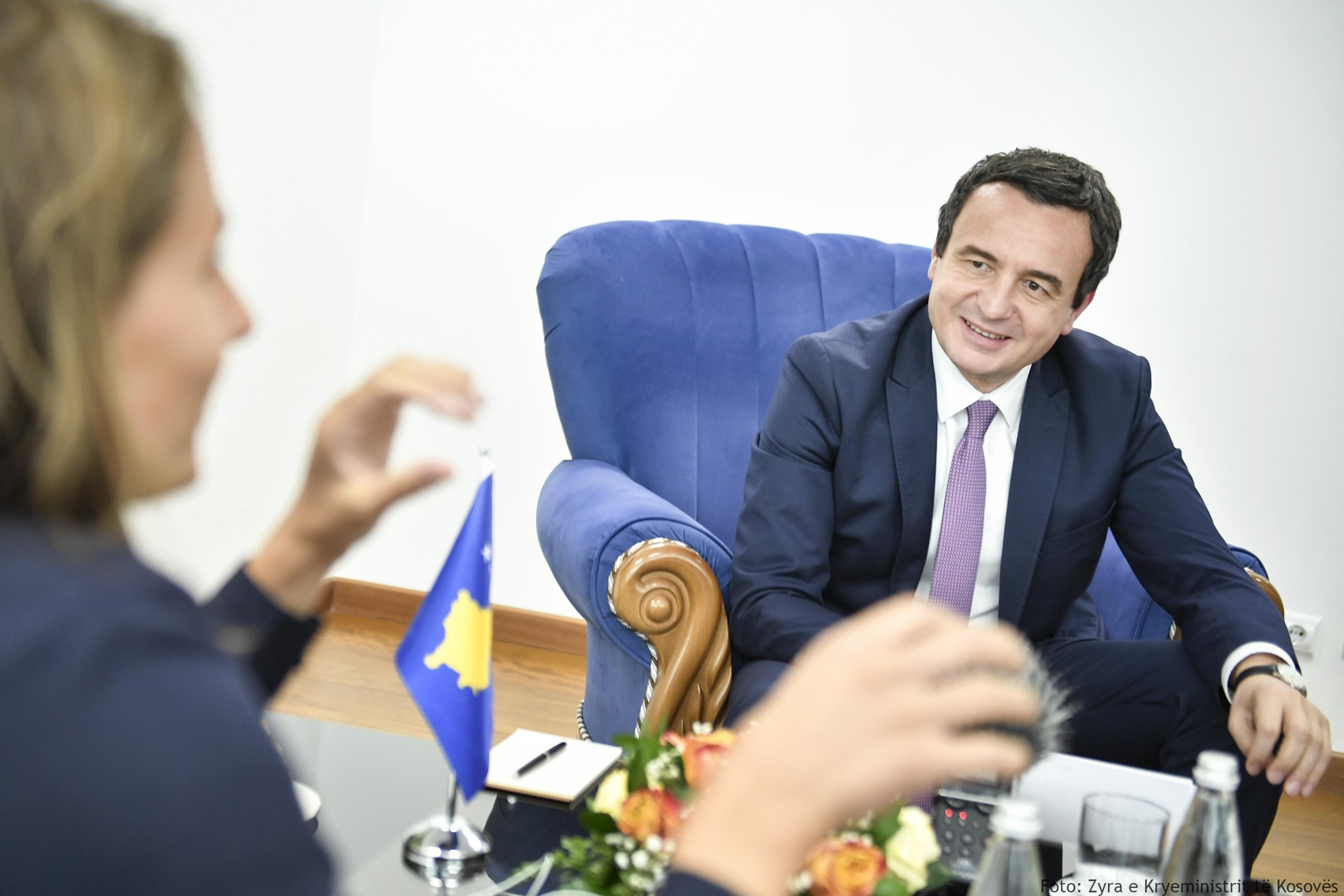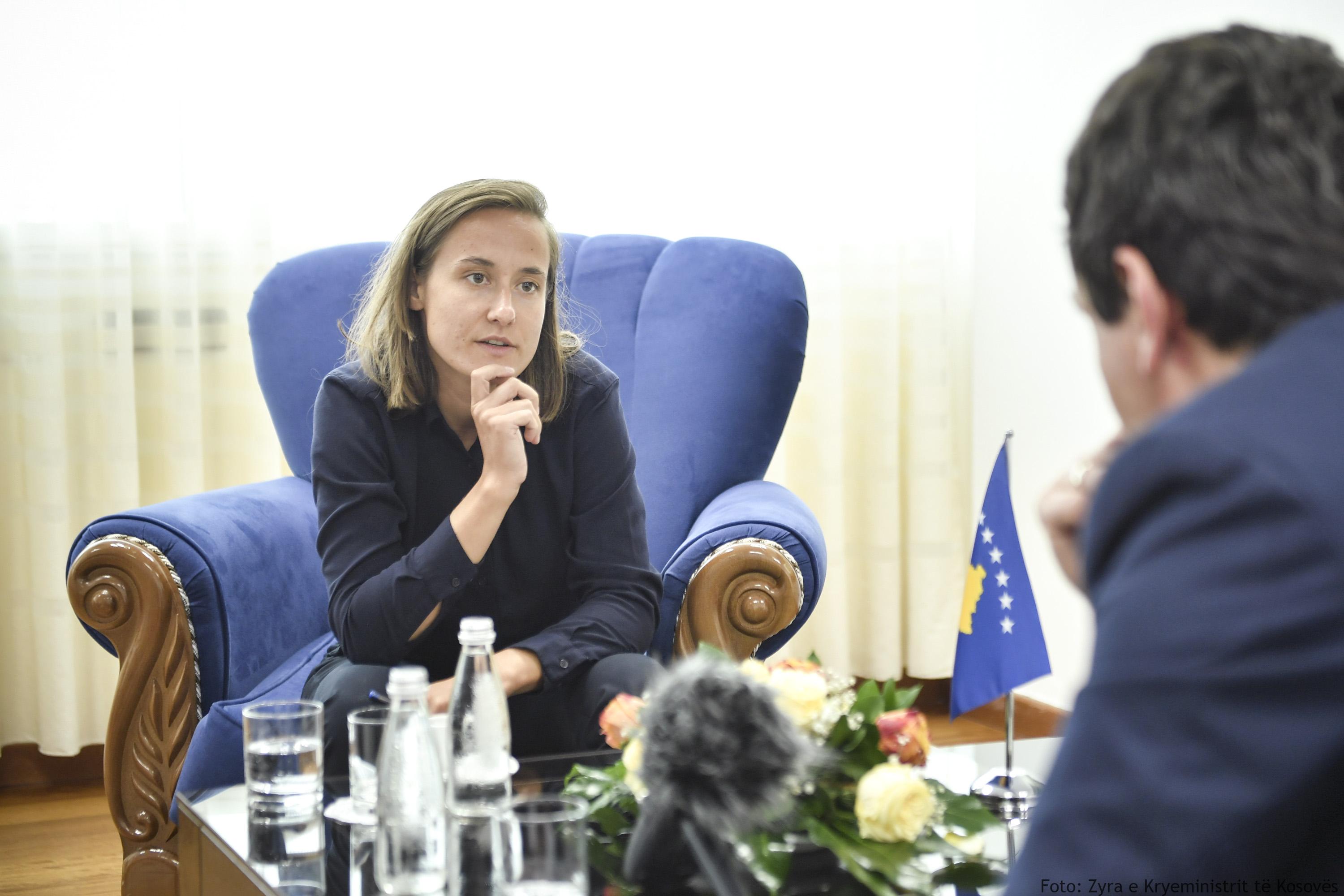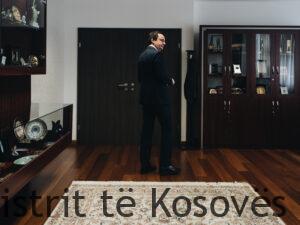The interview of the Prime Minister of the Republic of Kosovo, Albin Kurti for the Swiss magazine Republik with journalist Franziska Tschinderle, on September 9 and published on September 26, 2022.
Republik: Mr. Kurti, Serbian President Aleksandar Vučić recently called you “little Zelenski”. Does that honor you?
Prime Minister Kurti: I previously referred to Vučić as “Little Putin” on Facebook. I do not think he was creative enough to come up with anything better.
Republik: Putin invaded Ukraine a few months ago. The Serbian army has not crossed the border with Kosovo since the end of the war in 1999. Could it be that you are exaggerating?
Prime Minister Kurti: No, in my opinion, Serbia is a client regime of the Kremlin. Serbia and Russia conduct joint military drills called “Slavic Shield” and “Slavic Brotherhood”. Most of the oil industry in Serbia is owned by Gazprom. The Russian Ministry of Defense has established its office within the Ministry of Defense of Serbia. Serbia receives tanks and weapon systems from Moscow.
Germany is also dependent on Putin’s oil. But what makes Serbia unique in Europe is that it refuses to support EU sanctions against Putin.
Today, 70 percent of Serbs have a positive opinion of Vladimir Putin. At the same time, support for the European Union has fallen to an all-time low of 30 percent. This atmosphere has also spread to Serbs in Kosovo, especially in the north of the country.
Republik: We will talk about the north later. First a basic question: in an interview at the beginning of August you warned of a war with Serbia. Is it really that bad?
Prime Minister Kurti: We are not afraid, but we are vigilant. We remain concerned. According to me, there are four reasons that make a conflict conceivable. First, Serbia still does not recognize Kosovo’s independence. It fights against our international recognition and at the same time finances illegal structures inside Kosovo to undermine the rule of law and our sovereignty. Second: In Serbia, they cannot come to terms with the war crimes committed in the 1990s. There is no regret.
Republik: This criticism is not new: it was the same even before the war in Ukraine.
Prime Minister Kurti: The third reason that worries me: Kosovo is a democracy, Serbia is not. Anyone bordering on an autocracy is in danger. Fourth, official Belgrade maintains close ties with the despotic Russian President Putin. Vučić has met Putin almost 20 times in 10 years, most recently on 25 November 2021 in Sochi, three months before the start of the war.
[Kurti takes a sheet of paper from the table]
I will quote Vučić now: “We talked about double standards and hypocrisy in international relations. President Putin knows what I am talking about. We also talked about the north of Kosovo, and I showed it to Putin on the map”.
I wonder why Putin is interested in the north of Kosovo.
Republik: To Putin, NATO’s intervention against Serbia in 1999 was an insult. He never recognized Kosovo’s independence. Before the war, Putin spoke extremely often about Kosovo. He used it as an example to justify his invasion of Ukraine. How do you respond to him?
Prime Minister Kurti: The people of Kosovo experienced genocide. In the spring of 1999, 19 NATO countries got together and bombed a small country in Europe. So it must have been pretty bad. It is very difficult to have the agreement of 19 states, especially since they are democratic states, where there were even protests against the intervention. In Ukraine the situation is very different. It is the Russian army carrying out a military intervention – in Crimea, in Donbas, in the whole of Ukraine.
Republik: While you were warning about a possible war, thousands of young people danced at a concert by the singer Dua Lipa in Pristina. Does the state of crisis exist only in the rhetoric of politicians?
Prime Minister Kurti: I agree with you: ordinary people do not want conflict and do not encourage it. A few hundred people funded by Belgrade do this. Many of them have gained experience in the wars of the former Yugoslavia.
Republik: In the 1990s, Vučić was the information minister of a regime that arrested you and deported you to Serbia. 22 years later you are both sitting at a table and negotiating the future of your countries. Is this a personal pleasure for you?
Prime Minister Kurti: Not really. I would much prefer to see progressive and pro-European policies in Serbia. But it is not so. On the other hand, the atmosphere during our meetings in Brussels has improved.
Republik: Have you ever shaken hands?
Prime Minister Kurti: No, never. This is because we had three of the four meetings during the Corona virus pandemic and there is still no final agreement.
Republik: Let us move on to current events. The north of Kosovo is populated mainly by Serbs, about 50,000 inhabitants. On July 31, barricades were erected at the border. Disinformation on Twitter took off. Suddenly there was talk of an attack by Serbia. What really happened?
Prime Minister Kurti: That day, 13 barricades were erected, 9 of them in less than 10 minutes. Criminal gangs that are part of the illegal structures in the north linked to Belgrade set them up. Their purpose was to protect armed individuals behind barricades. The situation was very dangerous and tense. We are happy that there were no deaths.
A special unit of the Kosovo police, known as ROSU, continues to go north to crack down on smuggling activities. For many Serbs, they have become a kind of enemy. Young people refer to them as “invaders”.
Prime Minister Kurti: You know what is interesting? Between April last year and this August, Kosovar special forces arrested 71 people in the north: 33 Albanians, 26 Kosovo Serbs, 6 Serbs from Serbia, 3 Roma, 2 Bosniaks and 1 Gorani.
Republik: Are you saying that ethnicity is not important from the viewpoint of the police?
Prime Minister Kurti: Organized crime is multi-ethnic and cross-border. Serbia’s illegal structures in the north of Kosovo obviously have a problem with our police when it fights organized crime. In the fight against smuggling routes, drug labs and illegal cryptocurrency mining, our police have been repeatedly attacked, more than 14 times this year and last year alone, precisely by the criminals who erected the barricades in July. Some of them are on US sanctions lists.
Republik: I just returned from Mitrovica. The city is divided ethnically, with Albanians living in the south and Serbians in the north. US flags fly in the south, Russia’s war of aggression symbol “Z” is carved on the walls of houses in the north. How do you plan to fix this deep gap in your society?
Prime Minister Kurti: Most Serbs in Kosovo know that times have changed. They are integrated and a good example of this is that over 130,000 of them now have Kosovar ID cards. There is only a small minority – between 2,000 and 5,000 people – who refuse to recognize our documents. I am optimistic that things will turn out for the better. Illegal structures are losing more and more influence. Because of this, they are becoming more and more aggressive. The “Z” on the walls of houses is a sign of this.
Republik: People in the north drive with license plates issued in Belgrade. You want to change that.
Prime Minister Kurti: We are working hard for the Serbs in Kosovo to get Kosovo license plates, because only those are legal in this country. Now I have extended my hand to the people. Anyone who registers their car by October 31 pays neither taxes nor vehicle registration fees. This is very attractive for Serbs in Kosovo. This is exactly the reason why the illegal structures are putting pressure on the people. But there is still enough time to register their license plates.
Republik: Northern minorities are plastered with hundreds of placards that read “No surrender!”. People are especially asked to keep their Serbian license plates. Will you finally oblige them?
Prime Minister Kurti: After November 1, those license plates will be illegal, and we will act in accordance with our laws.
Republik: On 15 August 2021, the Taliban took power in Afghanistan after NATO had previously withdrawn from the country. Can you count on the Americans?
Prime Minister Kurti: NATO will remain in Kosovo because Kosovo wants to join NATO. Both are part of each other’s history – and will continue to be so in the future. There is no parallel between Afghanistan and Kosovo. The only thing I asked myself about August 15 was: How can I help with the refugee issue? As a result, Kosovo accepted about 1,800 Afghan refugees. NATO provides us with protection and security, and we also contribute something to the Western defense alliance. From March to June of last year, we participated in the military exercise “Defender Europe” with 330 soldiers and together with the US Army we sent a peacekeeping force to Kuwait.
Republik: You say all this knowing that your first government was overthrown at the behest of Washington? Trump’s envoy for the Balkans, Richard Grenell, wanted you gone. He saw you as a troublemaker with whom no deal could be reached.
Prime Minister Kurti: Kosovo considers the USA a friend, partner and ally for our security and defense. Again, with the exception of Belarus, there is no country closer to the Kremlin than Serbia. This is why the US is more important to us than any other country. But on the other hand, I do not agree with everything that every US representative says. This became clear in 2020 when President Trump’s envoy to the Balkans, Grenell, wanted me to drop my demands on Serbia.
Republik: Grenell calls you a “fascist” on Twitter today. What will this mean for the Balkans if Grenell’s boss, Donald Trump, returns one day?
Prime Minister Kurti: I am optimistic that things will go well in the USA. Joe Biden is the most progressive politician in the world today. I hope this transatlantic feeling is not lost. I hope for the best.
Republik: At the local level, your party Vetëvendosje recently suffered a defeat. The opposition won in most municipalities. How do you explain this?
Prime Minister Kurti: The opposition has united against us. Governing is tiring. It does not leave one that much time to be close to the base of the party and meet people. The pandemic has hit us harder than other parties because they traditionally advertise through TV spots. Our method has always been public meetings.
Republik: Could it be that you received fewer votes because the diaspora in Germany or Switzerland did not vote?
Prime Minister Kurti: You are right. At the local level, it participates in a much smaller number.
Republik: Let take, for instance, a young Albanian women from Switzerland – second or third generation. She lives in Bern and comes to Kosovo once during the summer. Should such a person be allowed to have a say in politics in your country?
Prime Minister Kurti: More airplanes travel between Prishtina and Switzerland per day than there are bus connections between certain cities in Kosovo. The diaspora does not come only once a year, but several times. Every third citizen of Kosovo lives abroad – most of them in Germany and Switzerland. Remittances make up 20 percent of the Gross Domestic Product. They may not live here, but they help us live here. Because of this material and financial contribution, but also for the knowledge they bring us, they should have a say in politics.
Republik: However, the diaspora does not replace the welfare state. How do you intend to fight poverty in your country?
Prime Minister Kurti: I consider the dual education system in Germany, Switzerland and Austria as a model. We need to connect the needs of the labor market with education. A few days ago I visited a class of students aged 15 to 18, part of dual education programs for hairdressers, masons, hospitality assistants, and chefs. They spend three days a week at school and two days a week at a company. This is a way to fight poverty and create jobs.
Republik: Your government recently put together packages worth millions to fight inflation and the energy crisis. Economic experts criticize: Fast money for a few months is not a particularly sustainable strategy.
Prime Minister Kurti: Students received one-time payments of 100 Euros – for the second time. We also gave child benefits for mothers with young children. We increased pensions by 11 percent and invalidity pensions by 33 percent. Local entrepreneurs, service providers and retailers also received cash. We have put together an economic stimulation package and an inflation package. We also subsidize energy consumption and facilitate those who reduce consumption, i.e. save energy. But I hope that we, like all of Europe, will get out of this crisis. And I hope we survive the winter. The Kremlin wants to divide Europe.
Republik: Four years ago, they explained to me in detail why you cannot identify yourself with the blue and gold flag of Kosovo. Has this changed now?
Prime Minister Kurti: As Prime Minister of the Republic, the flag of Kosovo is my duty and obligation and also something that I respect and embrace. This is my top priority. There may be many other things in the program of our movement.
Republik: Including, for example, that Albania and Kosovo can one day form a single state. Did you have to give up on this dream?
No one should give up on their dreams. But one must always act lawfully.





